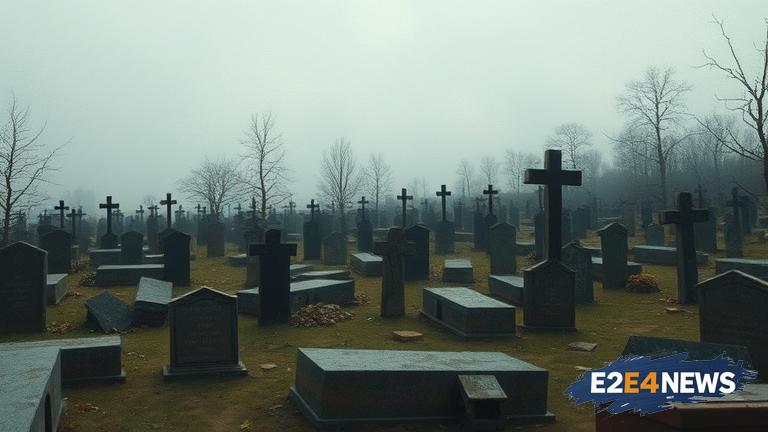The concept of a ‘graveyard of humanity’ is a stark reminder of the atrocities that have plagued human civilization throughout history. From the killing fields of Cambodia to the mass graves of Bosnia, these sites serve as a grim testament to the capacity for human cruelty. The News recently published an article highlighting the plight of mass graves in various parts of the world, sparking a necessary conversation about the importance of remembering and learning from these tragic events. One of the most infamous examples of a mass grave is the Killing Fields of Choeung Ek, where the Khmer Rouge regime brutally murdered an estimated 1.7 to 2.2 million people. The site has been transformed into a memorial, serving as a poignant reminder of the devastating consequences of unchecked power and ideology. Similarly, the mass graves in Bosnia, particularly in Srebrenica, are a stark reminder of the ethnic cleansing that occurred during the Bosnian War. The graves, which contain the remains of over 8,000 people, are a haunting testament to the brutality of the conflict. In Pakistan, the province of Balochistan is home to numerous mass graves, with many more suspected to exist. The discovery of these graves has sparked widespread outrage and calls for accountability, with many blaming the government and security forces for the disappearances and killings. The issue of mass graves is not limited to these regions, however, as similar sites can be found in countries such as Rwanda, Somalia, and Syria. The Rwandan Genocide, which occurred in 1994, resulted in the deaths of over 800,000 people, with many of their bodies buried in mass graves. In Somalia, the conflict between the government and militant groups has led to the creation of numerous mass graves, with many civilians caught in the crossfire. The Syrian Civil War has also resulted in the creation of mass graves, with many people killed or disappeared by government forces and militant groups. The existence of these mass graves serves as a stark reminder of the importance of promoting human rights and accountability. It is essential that governments and international organizations take concrete steps to investigate and prosecute those responsible for these atrocities. Furthermore, it is crucial that we remember and learn from these tragic events, ensuring that such horrors are never repeated. The article published in The News highlights the need for a comprehensive approach to addressing the issue of mass graves, including the provision of support to victims’ families and the establishment of truth and reconciliation commissions. Ultimately, the ‘graveyard of humanity’ serves as a poignant reminder of the darkest aspects of human nature, and it is our collective responsibility to ensure that such atrocities are never forgotten or repeated. The international community must come together to promote human rights, accountability, and justice, and to support those affected by these tragic events. By doing so, we can work towards creating a more just and equitable world, where the value of human life is respected and protected. The discovery of mass graves is often a painful reminder of the past, but it also presents an opportunity for healing and reconciliation. As we reflect on these tragic events, we must also acknowledge the resilience and courage of those who have survived and continue to fight for justice and accountability. In conclusion, the ‘graveyard of humanity’ is a stark reminder of the importance of promoting human rights, accountability, and justice. It is our collective responsibility to ensure that such atrocities are never forgotten or repeated, and to support those affected by these tragic events. By working together, we can create a more just and equitable world, where the value of human life is respected and protected. The article published in The News is a timely reminder of the need for a comprehensive approach to addressing the issue of mass graves, and we must all play our part in promoting human rights and accountability. As we move forward, it is essential that we remember the past, while also looking towards a future where such atrocities are never repeated. The ‘graveyard of humanity’ is a painful reminder of the darkest aspects of human nature, but it also presents an opportunity for healing, reconciliation, and growth.





